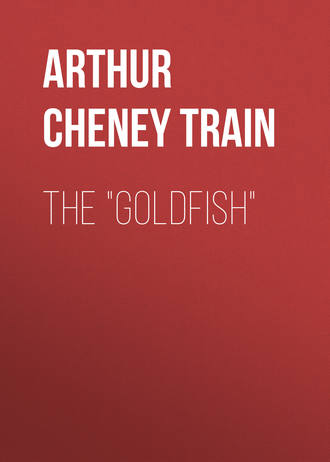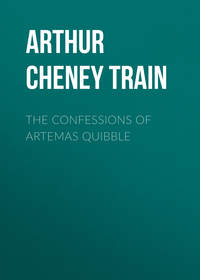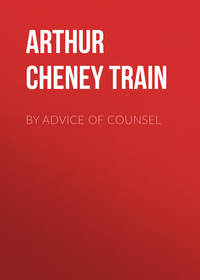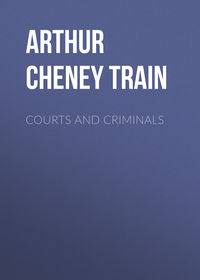 полная версия
полная версияThe "Goldfish"
"Perhaps you've really been going back."
"Perhaps," I admitted.
I have never tasted anything quite so good as those eggs and that milk. From where I sat I could look far up the Hudson; the wind from the river swayed the red maples round the door of the quick lunch; and from the kitchen came the homely smells of my lost youth. I had a fleeting vision of the party at my house, now playing bridge for ten cents a point; and my soul lifted its head for the first time in weeks.
"How far is it to Pleasantdale?"
"A long way," answered the girl; "but you can make a connection by trolley that will get you there in about two hours."
"Suits me!" I said and stepped to the door. "You can go, James; I'll get myself home."
He cast on me a scandalized look.
"Very good, sir!" he answered and touched his cap.
He must have thought me either a raving lunatic or an unabashed adventurer. A moment more and the car disappeared in the direction of the city. I was free! The girl made no attempt to conceal her amusement.
Behind the door was a gray felt hat. I took it down and looked at the size. It was within a quarter of my own.
"Look here," I suggested, holding out a five-dollar bill, "I want a Wishing Cap. Let me take this, will you?"
"The house is yours!" she laughed.
Over on the candy counter was a tray of corncob pipes. I helped myself to one, to a package of tobacco and a box of matches. I hung my derby on the vacant peg behind the door. Then I turned to my hostess.
"You're a good girl," I said. "Good luck to you."
For a moment something softer came into her eyes.
"And good luck to you, sir!" she replied. As I passed down the steps she threw after me: "I hope you'll find—what you're looking for!"
* * * * *In my old felt hat and smoking my corncob I trudged along the road in the mellow sunlight, almost happy. By and by I reached the trolley line; and for five cents, in company with a heterogeneous lot of country folks, Italian laborers and others, was transported an absurdly long distance across the state of New York to a wayside station.
There I sat on a truck on the platform and chatted with a husky, broad-shouldered youth, who said he was the "baggage smasher," until finally a little smoky train appeared and bore me southward. It was the best holiday I had had in years—and I was sorry when we pulled into Pleasantdale and I took to my legs again.
In the fading afternoon light it indeed seemed a pleasant, restful place. Comfortable cottages, each in its own yard, stood in neighborly rows along the shaded street. Small boys were playing football in a field adjoining a schoolhouse.
Presently the buildings became more scattered and I found myself following a real country road, though still less than half a mile from the station. Ahead it divided and in the resulting triangle, behind a well-clipped hedge, stood a pretty cottage with a red roof—Hastings', I was sure.
I tossed away my pipe and opened the gate. A rather pretty woman of about thirty-five was reading in a red hammock; there were half a dozen straw easy chairs and near by a teatable, with the kettle steaming. Mrs. Hastings looked up at my step on the gravel path and smiled a welcome.
"Jim has been playing golf over at the club—he didn't expect you until five," she said, coming to meet me.
"I don't care whether he comes or not," I returned gallantly. "I want to see you. Besides, I'm as hungry as a bear." She raised her eyebrows. "I had only an egg or so and a glass of milk for luncheon, and I have walked—miles!"
"Oh!" she exclaimed. I could see she had had quite a different idea of her erstwhile employer; but my statement seemed to put us on a more friendly footing from the start.
"I love walking too," she hastened to say. "Isn't it wonderful to-day? We get weeks of such weather as this every autumn." She busied herself over the teacups and then, stepping inside the door for a moment, returned with a plate piled high with buttered toast, and another with sandwiches of grape jelly.
"Carmen is out," she remarked; "otherwise you should be served in greater style."
"Carmen?"
"Carmen is our maid, butler and valet," she explained. "It's such a relief to get her out of the way once in a while and have the house all to oneself. That's one of the reasons I enjoy our two-weeks' camping trip so much every summer."
"You like the woods?"
"Better than anything, I think—except just being at home here. And the children have the time of their lives—fishing and climbing trees, and watching for deer in the boguns."
The gate clicked at that moment and Hastings, golf bag on shoulders, came up the path. He looked lean, brown, hard and happy.
"Just like me to be late!" he apologized. "I had no idea it would take me so long to beat Colonel Bogey."
"Your excuses are quite unnecessary. Mrs. Hastings and I have discovered that we are natural affinities," said I.
My stenographer, quite at ease, leaned his sticks in a corner and helped himself to a cup of tea and a couple of sandwiches, which in my opinion rivaled my eggs and milk of the early afternoon. My walk had made me comfortably tired; my lungs were distended with cool country air; my head was clear, and this domestic scene warmed the cockles of my heart.
"How is the Chicopee & Shamrock reorganization coming on?" asked Hastings, striving to be polite by suggesting a congenial subject for conversation.
"I don't know," I retorted. "I've forgotten all about it until Monday morning. On the other hand, how are your children coming on?"
"Sylvia is out gathering chestnuts," answered Mrs. Hastings, "and Tom is playing football. They'll be home directly. I wonder if you wouldn't like Jim to show you round our place?"
"Just the thing," I answered, for I guessed she had household duties to perform.
"Of course you'll stay to supper?" she pressed me.
I hesitated, though I knew I should stay, all the time.
"Well—if it really won't put you out," I replied. "I suppose there are evening trains?"
"One every hour. We'll get you home by ten o'clock."
"I'll have to telephone," I said, remembering my wife's regular Saturday-night bridge party.
"That's easily managed," said Hastings. "You can speak to your own house right from my library."
Again I barefacedly excused myself to my butler on the ground of important business. As we strolled through the gateway we were met by a sturdy little boy with tousled hair. He had on an enormous gray sweater and was hugging a pigskin.
"We beat 'em!" he shouted, unabashed by my obviously friendly presence.
"Eighteen to nothing!"
"Tom is twelve," said Hastings with a shade of pride in his voice. "Yes, the schools here are good. I expect to have him ready for college in five years more."
"What are you going to make of him?" I asked.
"A civil engineer, I think," he answered. "You see, I'm a crank on fresh air and building things—and he seems to be like me. This cooped-up city life is pretty narrowing, don't you think?"
"It's fierce!" I returned heartily, with more warmth than elegance. "Sometimes I wish I could chuck the whole business and go to farming."
"Why not?" he asked as we climbed a small rise behind the house. "Here's my farm—fifteen acres. We raise most of our own truck."
Below the hill a cornfield, now yellow with pumpkins, stretched to the farther road. Nearer the house was a kitchen garden, with an apple orchard beyond. A man in shirtsleeves was milking a cow behind a tiny barn.
"I bought this place three years ago for thirty-nine hundred dollars," said my stenographer. "They say it is worth nearer six thousand now. Anyhow it is worth a hundred thousand to me!"
A little girl, with bulging apron, appeared at the edge of the orchard and came running toward us.
"What have you got there?" called her father.
"Oh, daddy! Such lovely chestnuts!" cried the child. "And there are millions more of them!"
"We'll roast 'em after supper," said her father. "Toddle along now and wash up."
She put up a rosy, beaming face to be kissed and dashed away toward the house. I tried to remember what either of my two girls had been like at her age, but for some strange reason I could not.
Across the road the fertile countryside sloped away into a distant valley, hemmed in by dim blue hills, below which the sun had already sunk, leaving only a gilded edge behind. The air was filled with a soft, smoky haze. A church bell in the village struck six o'clock.
"The curfew tolls the knell of parting day, The lowing herd winds slowly o'er the lea,The plowman homeward plods his weary way,"I murmured.
"For 'plowman' read 'golfer,'" smiled my host. "By George, though—it is pretty good to be alive!" The air had turned crisp and we both instinctively took a couple of deep breaths. "Makes the city look like thirty cents!" he ejaculated. "Of course it isn't like New York or Southampton."
"No, thank God! It isn't!" I muttered as we wandered toward the house.
"I hope you don't mind an early supper," apologized Mrs. Hastings as we entered; "but Jim gets absolutely ravenous. You see, on weekdays his lunch is at best a movable feast."
Our promptly served meal consisted of soup, scrambled eggs and bacon, broiled chops, fried potatoes, peas, salad, apple pie, cheese, grapes plucked fresh from the garden wall, and black coffee, distilled from a shining coffee machine. Mrs. Hastings brought the things hot from the kitchen and dished them herself. Tom and Sylvia, carefully spruced up, ate prodigiously and then helped clear away the dishes, while I produced my cigar case.
Then Hastings led me across the hall to a room about twelve feet square, the walls of which were lined with books, where a wood fire was already crackling cozily. Motioning me to an old leather armchair, he pulled up a wooden rocker before the mantel and, leaning over, laid a regiment of chestnuts before the blazing logs.
I stretched out my legs and took a long pull on one of my Carona-Caronas. It all seemed too good to be true. Only six hours before in my marble entrance hall I had listened disgustedly to the cackle of my wife's luncheon party behind the tapestry of my own dining room.
After all, how easy it was to be happy! Here was Hastings, jolly as a clam and living like a prince on—what? I wondered.
"Hastings," I said, "do you mind telling me how much it costs you to live like this?"
"Not at all," he replied—"though I never figured it out exactly. Let's see. Five per cent on the cost of the place—say, two hundred dollars. Repairs and insurance a hundred. That's three hundred, isn't it? We pay the hired man thirty-five dollars and Carmen eighteen dollars a month, and give 'em their board—about six hundred and fifty more. So far nine hundred and fifty. Our vegetables and milk cost us practically nothing—meat and groceries about seventy-five a month—nine hundred a year.
"We have one horse; but in good weather I use my bicycle to go to the station. We cut our own ice in the pond back of the orchard. The schools are free. I cut quite a lot of wood myself, but my coal comes high—must cost me at least a hundred and fifty a year. I don't have many doctors' bills, living out here; but the dentist hits us for about twenty-five dollars every six months—that's fifty more. My wife spends about three hundred and the children as much more. Of course that's fairly liberal. One doesn't need ballgowns in our village.
"My own expenses are, railroad fare, lunches, tobacco—I smoke a pipe mostly—and clothes—probably about five hundred in all. We go on a big bat once a month and dine at a table-d'hôte restaurant, and take in the opera or the play. That costs some—about ten dollars a clip—say, eighty for the season; and, of course, I blow the kids to a camping trip every summer, which sets me back a good hundred and fifty. How does that come out?"
I had jotted the items down, as he went along, on the back of an envelope.
"Thirty-three hundred and eighty dollars," I said, adding them up.
"It seems a good deal," he commented, turning and gazing into the fire; "but I have usually managed to lay up about fifteen hundred every year—besides, of course, the little I give away."
I sat stunned. Thirty-three hundred dollars!—I spent seventy-two thousand!—and the man lived as well as I did! What did I have that he had not? But Hastings was saying something, still with his back toward me.
"I suppose you thought I must be an ungrateful dog not to jump at the offer you made me this morning," he remarked in an embarrassed manner. "It's worried me a lot all day. I'm really tremendously gratified at your kindness. I couldn't very well explain myself, and I don't know what possessed me to say what I did about my not being willing to exchange places with you. But, you see, I'm over forty. That makes a heap of difference. I'm as good a stenographer as you can find, and so long as my health holds out I can be sure of at least fifty dollars a week, besides what I earn outside.
"I've never had any kink for the law. I don't think I'd be a success at it; and frankly, saving your presence, I don't like it. A lot of it is easy money and a lot of it is money earned in the meanest way there is—playing dirty tricks; putting in the wrong a fellow that's really right; aggravating misunderstandings and profiting by the quarrels people get into. You're a high-class, honorable man, and you don't see the things I see." I winced. If he only knew, I had seen a good deal! "But I go round among the other law offices, and I tell you it's a demoralizing profession.
"It's all right to reorganize a railroad; but in general litigation it seems to me as if the lawyers spend most of their time trying to make the judge and jury believe the witnesses are all criminals. Everything a man says on the stand or has ever done in his life is made the subject of a false inference—an innuendo. The law isn't constructive—it's destructive; and that's why I want my boy to be a civil engineer."
He paused, abashed at his own heat.
"Well," I interjected, "it's a harsh arraignment; but there's a great deal of truth in what you say. Wouldn't you like to make big money?"
"Big money! I do make big money—for a man of my class," he replied with a gentle smile. "I wouldn't know what to do with much more. I've got health and a comfortable home, the affection of an honest woman and two fine children. I work hard, sleep like a log, and get a couple of sets of tennis or a round of golf on Saturdays and Sundays. I have the satisfaction of knowing I give you your money's worth for the salary you pay me. My kids have as good teachers as there are anywhere. We see plenty of people and I belong to a club or two. I bear a good reputation in the town and try to keep things going in the right direction. We have all the books and magazines we want to read. What's more, I don't worry about trying to be something I'm not."
"How do you mean?" I asked, feeling that his talk was money in my moral pocket.
"Oh, I've seen a heap of misery in New York due to just wanting to get ahead—I don't know where; fellows that are just crazy to make 'big money' as you call it, in order to ride in motors and get into some sort of society. All the clerks, office boys and stenographers seem to want to become stockbrokers. Personally I don't see what there is in it for them. I don't figure out that my boy would be any happier with two million dollars than without. If he had it he would be worrying all the time for fear he wasn't getting enough fun for his money. And as for my girl I want her to learn to do something! I want her to have the discipline that comes from knowing how to earn her own living. Of course that's one of the greatest satisfactions there is in life anyway—doing some one thing as well as it can be done."
"Wouldn't you like your daughter to marry?" I demanded.
"Certainly—if she can find a clean man who wants her. Why, it goes without saying, that is life's greatest happiness—that and having children."
"Certainly!" I echoed with an inward qualm.
"Suppose she doesn't marry though? That's the point. She doesn't want to hang round a boarding house all her life when everybody is busy doing interesting things. I've got a theory that the reason rich people—especially rich women—get bored is because they don't know anything about real life. Put one of 'em in a law office, hitting a typewriter at fifteen dollars a week, and in a month she'd wake up to what was really going on—she'd be alive!"
"'The world is so full of a number of things I'm sure we should all be as happy as kings!'"
said I. "What's Sylvia going to do?"
"Oh, she's quite a clever little artist." He handed me some charming sketches in pencil that were lying on the table. "I think she may make an illustrator. Heaven knows we need 'em! I'll give her a course at Pratt Institute and then at the Academy of Design; and after that, if they think she is good enough, I'll send her to Paris."
"I wish I'd done the same thing with my girls!" I sighed. "But the trouble is—the trouble is—You see, if I had they wouldn't have been doing what their friends were doing. They'd have been out of it."
"No; they wouldn't like that, of course," agreed Hastings respectfully. "They would want to be 'in it'"
I looked at him quickly to see whether his remark had a double entendre.
"I don't see very much of my daughters," I continued. "They've got away from me somehow."
"That's the tough part of it," he said thoughtfully. "I suppose rich people are so busy with all the things they have to do that they haven't much time for fooling round with their children. I have a good time with mine though. They're too young to get away anyhow. We read French history aloud every evening after supper. Sylvia is almost an expert on the Duke of Guise and the Massacre of St. Bartholomew."
We smoked silently for some moments. Hastings' ideas interested me, but I felt that he could give me something more personal—of more value to myself. The fellow was really a philosopher in his quiet way.
"After all, you haven't told me what you meant by saying you wouldn't change places with me," I said abruptly. "What did you mean by that? I want to know."
"I wish you would forget I ever said it, sir," he murmured.
"No," I retorted, "I can't forget it. You needn't spare me. This talk is not ex cathedra—it's just between ourselves. When you've told me why, then I will forget it. This is man to man."
"Well," he answered slowly, "it would take me a long time to put it in just the right way. There was nothing personal in what I said this morning. I was thinking about conditions in general—the whole thing. It can't go on!"
"What can't go on?"
"The terrible burden of money," he said.
"Terrible burden of money!" I repeated. What did he mean?
"The weight of it—that's bowing people down and choking them up. It's like a ball and chain. I meant I wouldn't change places with any man in the millionaire class—I couldn't stand the complexities and responsibilities. I believe the time is coming when no citizen will be permitted to receive an income from his inherited or accumulated possessions greater than is good for him. You may say that's the wildest sort of socialism. Perhaps it is. But it's socialism looked at from a different angle from the platform orators—the angle of the individual.
"I don't believe a man's money should be taken away from him and distributed round for the sake of other people—but for the protection of the man himself. There's got to be a pecuniary safety valve. Every dollar over a certain amount, just like every extra pound of steam in a boiler, is a thing of danger. We want health in the individual and in the state—not disease.
"Let the amount of a man's income be five, ten, fifteen or twenty thousand dollars—the exact figure doesn't matter; but there is a limit at which wealth becomes a drag and a detriment instead of a benefit! I'd base the legality of a confiscatory income tax on the constitutionality of any health regulation or police ordinance. People shouldn't be permitted to injure themselves—or have poison lying round. Certainly it's a lesson that history teaches on every page.
"Besides everybody needs something to work for—to keep him fit—at least that's the way it looks to me. Nations—let alone mere individuals—have simply gone to seed, died of dry rot because they no longer had any stimulus. A fellow has got to have some idea in the back of his head as to what he's after—and the harder it is for him to get it, the better, as a rule, it is for him. Good luck is the worst enemy a heap of people have. Misfortune spurs a man on, tries him out and develops him—makes him more human."
"Ever played in hard luck?" I queried.
"I? Sure, I have," answered Hastings cheerfully. "And I wouldn't worry much if it came my way again. I could manage to get along pretty comfortably on less than half I've got. I like my home; but we could be happy anywhere so long as we had ourselves and our health and a few books. However, I wasn't thinking of myself. I've got a friend in the brokering business who says it's the millionaires that do most of the worrying anyhow. Naturally a man with a pile of money has to look after it; but what puzzles me is why anybody should want it in the first place."
He searched along a well-filled and disordered shelf of shabby books.
"Here's what William James says about it:
"'We have grown literally afraid to be poor. We despise any one who elects to be poor in order to simplify and save his inner life. We have lost the power of even imagining what the ancient idealization of poverty could have meant—the liberation from material attachments; the unbribed soul; the manlier indifference; the paying our way by what we are or do, and not by what we have; the right to fling away our life at any moment irresponsibly—the more athletic trim, in short the moral fighting shape…. It is certain that the prevalent fear of poverty among the educated class is the worst moral disease from which our civilization suffers.'"
"I guess he's about right," I agreed.
"That's my idea exactly," answered Hastings. "As I look at it the curse of most of the people living on Fifth Avenue is that they're perfectly safe. You could take away nine-tenths of what they've got and they'd still have about a hundred times more money than they needed to be comfortable. They're like a whole lot of fat animals in an inclosure—they're fed three or four times a day, but the wire fence that protects them from harm deprives them of any real liberty. Or they're like goldfish swimming round and round in a big bowl. They can look through sort of dimly; but they can't get out! If they really knew, they'd trade their security for their freedom any time.
"Perfect safety isn't an unmixed blessing by any means. Look at the photographs of the wild Indians—the ones that carried their lives in their hands every minute—and there's something stern and noble about their faces. Put an Indian on a reservation and he takes to drinking whisky. It was the same way with the chaps that lived in the Middle Ages and had to wear shirts of chainmail. It kept 'em guessing. That's merely one phase of it.
"The real thing to put the bite into life is having a Cause. People forget how to make sacrifices—or become afraid to. After all, even dying isn't such a tremendous trick. Plenty of people have done it just for an idea—wanted to pray in their own way. But this modern way of living takes all the sap out of folks. They get an entirely false impression of the relative values of things. It takes a failure or a death in the family to wake them up to the comparative triviality of the worth of money as compared, for instance, to human affection—any of the real things of life.
"I don't object to inequality of mere wealth in itself, because I wouldn't dignify money to that extent. Of course I do object to a situation where the rich man can buy life and health for his sick child and the poor man can't. Too many sick babies! That'll be attended to, all right, in time. I wouldn't take away one man's money for the sake of giving it to others—not a bit of it. But what I would do would be to put it out of a man's power to poison himself with money.
"Suicide is made a crime under the law. How about moral and intellectual suicide? It ought to be prevented for the sake of the state. No citizen should be allowed to stultify himself with luxury any more than he should be permitted to cut off his right hand. Excuse me for being didactic—but you said you'd like to get my point of view and I've tried to give it to you in a disjointed sort of way. I'd sooner my son would have to work for his living than not, and I'd rather he'd spend his life contending with the forces of nature and developing the country than in quarreling over the division of profits that other men had earned."





